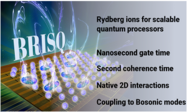
Trapped ions are one of the leading platforms for scalable quantum computing. Complementary, neutral atoms that are laser-excited to Rydberg states offer very strong and long-range interactions, which can be exploited for the realisation of fast quantum gate operations. Why not combining both approaches in a fruitful way? The new research collaboration BRISQ, starting in autumn 2022, takes this novel approach to quantum computing: It is centred around the only very recently established but highly promising physical platform to host a scalable quantum computer – laser-excited trapped ions in Rydberg states. This platform enables ultra-fast gate operations on nanosecond timescales combined with seconds of coherence time in a trapped ion system. At the same time strong controllable dipolar interactions in 2D or even 3D geometries enable scalability and coupling of hundreds of qubits. Together with colleagues from the universities at Stockholm, Innsbruck and Tübingen and from the leading industrial and commercial partners Infineon Technologies and HQS Quantum Simulations, we will theoretically explore and experimentally realise the potential of this new fascinating platform for quantum computation. Our group, who has been involved in pioneering the idea of using ionic Rydberg states for quantum information processing [1], will develop Rydberg-ion quantum gate protocols and novel quantum error mitigation and correction strategies.
[1] Trapped Rydberg Ions: From Spin Chains to Fast Quantum Gates, M. Müller, L. Liang, I. Lesanovsky, P. Zoller, New Journal of Physics 10, 093009, (2008)

